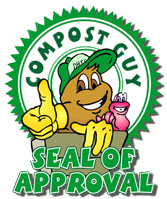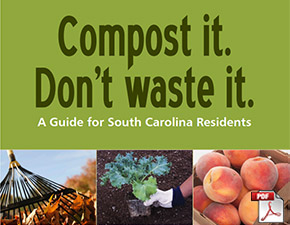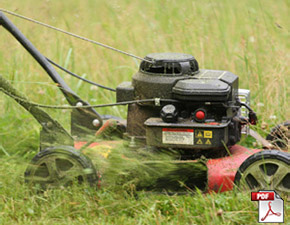
Food Waste Resources
SCDHEC Resources
Composting

Greenville County actively promotes composting, grass cycling, and vermicomposting. See our list of
resources for more information.
Americans throw away 28 million tons each year of yard wastes composed of grass, leaves, and limbs,
branches, and other yard clippings. Then, these same Americans spend millions of dollars on 25-50
million tons of fertilizers, soil amendments, and mulch to enhance their lawns and gardens. Too bad
the average American family doesn’t realize that composting can result in 300 to 400 pounds of finished
compost each year and that this compost can be used as a fertilizer, soil amendments, or mulch.
Composting is the natural "circle of life." For example, when leaves fall from trees they are eaten by
bacteria. This converts the organic leafy material into humus, a nutrient-rich non-compacted soil that
helps new plants get started.
When properly maintained, the process of composting is sanitary and efficient. In addition, generating
household compost is very cost effective when compared to the average household expenditure on potting
soil and soil amendments as well as the household costs for the removal of garbage and yard wastes paid
for through taxes. Furthermore, 70% of the average household’s waste is compost friendly matter. Many
materials can be included in compost piles that are not commonly thought of as compost friendly
(e.g., coffee grounds, filters, eggshells, and even shredded paper).
Many gardeners enjoy the benefits of composting in their vegetable and flower gardens, while others
avoid composting for fear of pests, foul odors, and the extra work. The keys to overcoming composting
concerns are simple.
- Pests can be avoided by using a closed bin or wire fencing, avoiding meat and dairy, and
burying vegetables under soil or yard clippings to avoid attracting flies and insects.
- Foul odors are easily avoidable by burying materials that decay rapidly (e.g., food wastes)
deep in the pile, keeping the mix of brown (leaf/branch/dirt) to green (grass/food) matter at
less than 50:50 (aim for 30:1 brown to green as green matter tends to decompose rapidly and may
pose problems when in excessive amounts). And, odors can be avoided by aeration, and by keeping
the compost sufficiently moist.
- As for the work…well, if you are trying to make your own successful garden without hard
work…what is the secret? Also, keep in mind that slow compost does not require as much attention
as the rapid composting caused by excessive green matter.

Compost piles can be as simple as piles of yard waste, wire fenced piles, or as complex as a trash can
with air holes or a fabricated tumbling bin. The important things to remember are:
- Avoid adding meat and dairy products since they attract animals
- The smaller the particles, the less time they take to compost so chip trees and branches
- Avoid adding diseased plants and seedy weeds
- Consider using pine needles and shredded rubbery leaves (magnolia) as mulch instead of compost
Compost can be ready for harvest in as few as 4 weeks, but can take several months depending on the
temperature, components and other factors. But, there is no measure of time for the benefits of compost.
Greenville County provides the following resources that may help you in your composting activities:
- Instructions to help you compost more effectively
- Instructions to help you grass cycle
- Information on vermicomposting (composting with worms)
- DHEC FYI bulletins:

Composting Brochure

Grasscycling Brochure